| Srl | Item |
| 1 |
ID:
147206
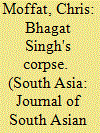

|
|
|
|
|
| Summary/Abstract |
This article explores how a sense of responsibility toward the revolutionary Bhagat Singh (1907–31) is mediated by and articulated through a relationship with the martyr's written remains. It considers how efforts to reconstruct ‘the real’ Bhagat Singh propel a polemic around the ‘proper’ subject of Indian politics, one that destabilises common sense nationalist narratives and extant autobiographies of the Indian Left. These interventions must, however, grapple with the anarchic potentiality of Bhagat Singh's self-sacrifice: empiricist efforts are tempted to engage in spectral practices of conjecture and counterfactual, building a politics of inheritance around a future that never came to pass.
|
|
|
|
|
|
|
|
|
|
|
|
|
|
|
|
| 2 |
ID:
147203
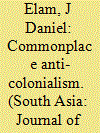

|
|
|
|
|
| Summary/Abstract |
Bhagat Singh (1907–31) is popularly celebrated as one of the major leaders of the Indian anti-colonial movement. Scholars have pointed to his writings to demonstrate his philosophical mastery. One of the primary texts used to support this claim is the activist's jail notebook, a collection of reading notes Bhagat Singh produced while in jail. The existence of the jail notebook, however, has only been used as proof of Bhagat Singh's mastery, rather than as possibly articulating its own philosophy for anti-colonial revolution. This essay analyses Bhagat Singh's jail notebook in order to offer a theory of ‘commonplace anti-colonialism’ and inconsequence. Rather than use the jail notebook to corroborate Bhagat Singh's ‘mastery’ as an anti-colonial revolutionary thinker, this essay argues that the jail notebook reveals a more radical revolutionary politics: of reading. Bhagat Singh's reading practices, especially in the face of death, suggest a new way to theorise ‘revolution’ as the perpetual deferment of authority and mastery, rather than the eventual assumption of those positions. Consequently, ‘inconsequential reading’ may, in turn, reveal a more radically egalitarian politics of revolution than previously ascribed to Bhagat Singh.
|
|
|
|
|
|
|
|
|
|
|
|
|
|
|
|
| 3 |
ID:
115286
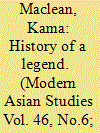

|
|
|
|
|
| Publication |
2012.
|
| Summary/Abstract |
Narratives about the revolutionary movement have largely been the preserve of the popular domain in India, as Christopher Pinney has recently pointed out. India's best-known revolutionary, Bhagat Singh-who was executed by the British in 1931 for his role in the Lahore Conspiracy Case-has been celebrated more in posters, colourful bazaar histories and comic books than in academic tomes. These popular formats have established a hegemonic narrative of his life that has proved to be resistant to subsequent interventions as new materials, such as freshly-declassified intelligence reports and oral history testimonies, come to light. This paper accounts for why Bhagat Singh's life story has predominantly prevailed in the domain of the popular, with special reference to the secrecy of the revolutionary movement and the censure and censorship to which it was subjected in the 1930s.
|
|
|
|
|
|
|
|
|
|
|
|
|
|
|
|
| 4 |
ID:
064429
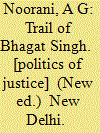

|
|
|
|
|
| Edition |
New ed.
|
| Publication |
New Delhi, Oxford University Press, 2005.
|
| Description |
xxvi, 339p.pbk
|
| Series |
Oxford India Paperback
|
| Standard Number |
0195678176
|
|
|
|
|
|
|
|
|
|
|
|
Copies: C:1/I:0,R:0,Q:0
Circulation
| Accession# | Call# | Current Location | Status | Policy | Location |
| 049866 | 954.035/NOO 049866 | Main | On Shelf | General | |
|
|
|
|
| 5 |
ID:
139980
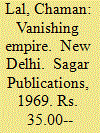

|
|
|
|
|
| Publication |
New Delhi, Sagar publications, 1969.
|
| Description |
xxvi, 305p.: ill.hbk
|
|
|
|
|
|
|
|
|
|
|
|
Copies: C:1/I:0,R:0,Q:0
Circulation
| Accession# | Call# | Current Location | Status | Policy | Location |
| 010025 | 954.0359/LAL 010025 | Main | On Shelf | General | |
|
|
|
|